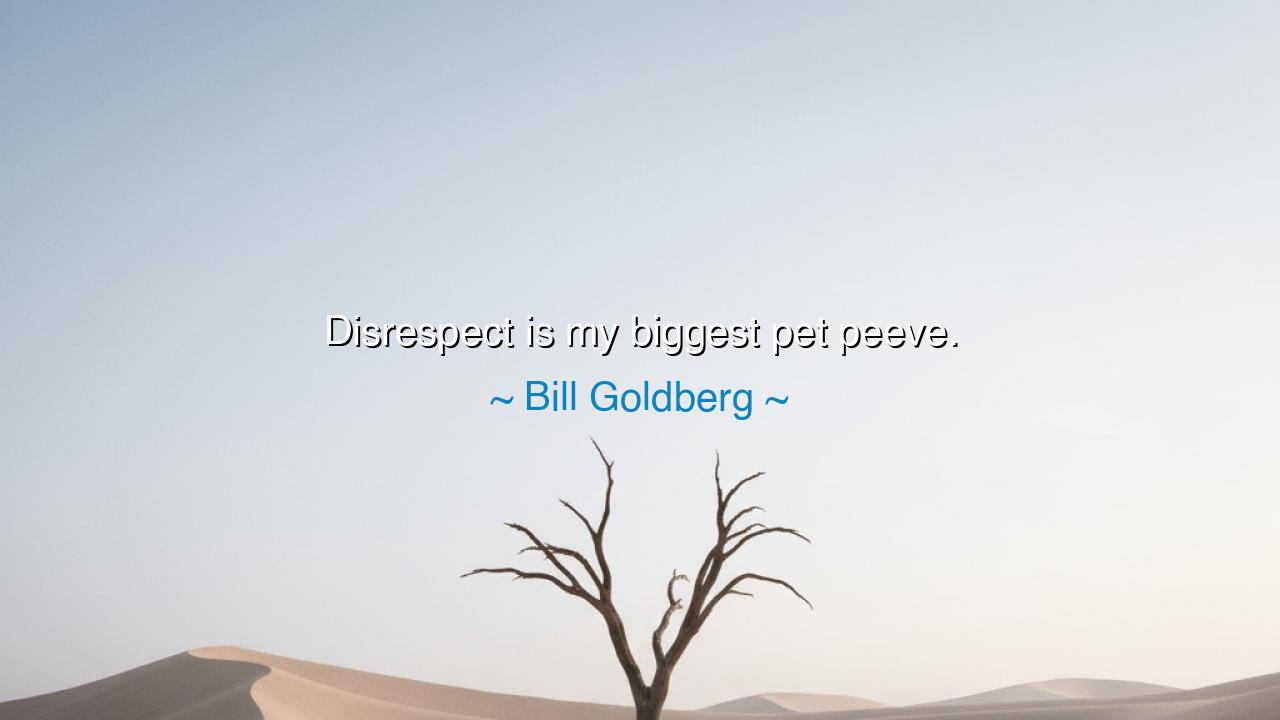
Disrespect is my biggest pet peeve.






Bill Goldberg, a man of great physical might and fierce presence, once declared with piercing clarity: “Disrespect is my biggest pet peeve.” Though the words are simple, they echo with the weight of ages. For disrespect is not a small offense—it is the seed of division, the spark of conflict, the poison that corrodes honor and fellowship. To disdain another, to treat them as less than human, is to violate the very fabric of community. Goldberg’s words rise like a shield, defending not only his own dignity but also the sacred principle of mutual regard.
The ancients knew well the destructive power of disrespect. In their stories, wars began not only for land or gold, but for insults left unanswered. The Greeks tell us of Achilles, who withdrew from battle when his honor was slighted by Agamemnon. His absence nearly doomed the entire army, showing how a single act of scorn can unravel the strength of many. Respect binds people together, but disrespect tears them apart. Thus Goldberg’s declaration is not personal alone—it is universal, reminding us of what civilizations have always known: without respect, there can be no order, no peace, no true strength.
Yet disrespect is more than an outward insult. It can be subtle: dismissing another’s voice, mocking their effort, ignoring their worth. These acts may seem small, but they are daggers to the soul. A man or woman who feels unseen is wounded, and wounded hearts can harden into bitterness. To Goldberg, whose life was lived in the arena where honor and pride are ever on display, respect is the foundation of strength. To strip it away is to deny a person’s humanity.
History offers lessons here. Consider George Washington at the end of the Revolutionary War. His soldiers, weary and unpaid, were ready to rebel against the very government they had fought to create. Washington stood before them, not with threats but with humility, acknowledging their sacrifices and showing them respect. He removed his spectacles, saying, “Gentlemen, you must pardon me, for I have grown not only gray but almost blind in the service of my country.” His words, filled with honor and reverence, calmed their fury and restored their loyalty. Respect averted chaos where disrespect would have destroyed a nation’s beginning.
Goldberg’s words also teach us something of the warrior’s heart. Strength alone does not command reverence—true strength demands respect for others. The gladiator who mocks his foe may win applause, but the warrior who honors even the defeated earns immortality. To despise others is easy; to respect them requires discipline, humility, and wisdom. The true giant, like Goldberg, knows that honor matters more than power, and that dignity is the true crown of the human spirit.
The lesson is thus: guard yourself against disrespect, whether giving or receiving it. Do not tolerate it in your dealings, for to let it pass unchallenged is to diminish yourself. Yet also, do not be the one who sows it. Treat all with the dignity you would demand for yourself: the young, the old, the strong, the weak, the stranger, the friend. Respect is the foundation upon which trust, loyalty, and greatness are built. Without it, all collapses.
Therefore, let Goldberg’s words be carried like a banner: disrespect is not to be endured. Let your life be marked by respect—respect for self, for others, for the labor and sacrifice of those who came before. Correct the arrogant, honor the humble, and speak with reverence even to those you oppose. For in the end, the measure of a person’s greatness is not how loudly they roar, but how deeply they honor the worth of every soul they meet.






AAdministratorAdministrator
Welcome, honored guests. Please leave a comment, we will respond soon